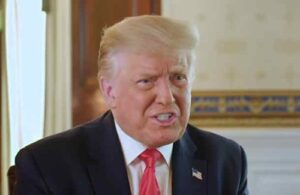The judge ordered the former president’s lawyer John Eastman to provide the January 6 panel with emails deemed “sufficiently related to and in furtherance of a conspiracy to defraud the United States.”

A federal judge indicated Wednesday that former U.S. President Donald Trump signed a legal document containing voter fraud claims about the 2020 presidential election that he knew were false.
“The emails show that President Trump knew that the specific numbers of voter fraud were wrong but continued to tout those numbers, both in court and to the public.”
That revelation came in U.S. District Judge David Carter’s ruling that ordered ex-Trump lawyer John Eastman—considered —to share some emails with the House Select Committee to Investigate the January 6th Attack on the United States Capitol.
Critics of the twice-impeached former president argue his “Big Lie” that the election was rigged by Democrats provoked the 2021 attack, which is tied to at least seven deaths and briefly delayed the certification of the results. As the new ruling highlights, Trump’s bid to hold on to power despite losing reelection also featured legal battles over the outcomes in specific swing states.
“Four emails demonstrate an effort by President Trump and his attorneys to press false claims in federal court for the purpose of delaying the January 6 vote,” wrote Carter, a California-based judge appointed by former President Bill Clinton. “The evidence confirms that this effort was undertaken in at least one lawsuit filed in Georgia.”
Trump and his legal team claimed to a Georgia state court on December 4, 2020 that Fulton County improperly counted votes from 10,315 deceased people, 2,560 felons, and 2,423 unregistered voters. The battle then moved to federal court.
“On December 30, 2020, Dr. Eastman relayed ‘concerns’ from President Trump’s team ‘about including specific numbers in the paragraph dealing with felons, deceased, moved, etc.’ The attorneys continued to discuss the president’s resistance to signing ‘when specific numbers were included,” Carter explained.
According to the judge, Eastman wrote in an email on December 31, 2020: “Although the President signed a verification for [the state court filing] back on Dec. 1, he has since been made aware that some of the allegations (and evidence proffered by the experts) has been inaccurate. For him to sign a new verification with that knowledge (and incorporation by reference) would not be accurate.”
Carter noted that “President Trump and his attorneys ultimately filed the complaint with the same inaccurate numbers without rectifying, clarifying, or otherwise changing them. President Trump, moreover, signed a verification swearing under oath that the incorporated, inaccurate numbers ‘are true and correct’ or ‘believed to be true and correct’ to the best of his knowledge and belief.”
“The emails show that President Trump knew that the specific numbers of voter fraud were wrong but continued to tout those numbers, both in court and to the public,” the judge continued. “The court finds that these emails are sufficiently related to and in furtherance of a conspiracy to defraud the United States.”
As The New York Times reported Wednesday:
The episode was the latest example of how Mr. Trump was repeatedly told that his claims of widespread voter fraud were false and often pressed forward with them anyway. His attorney general at the time, William P. Barr, informed him at least three times that his accusations about fraud were unfounded, as did other top officials at the Justice Department, the White House Counsel’s Office, and the Trump campaign.
Judge Carter’s ruling came as part of a federal lawsuit Mr. Eastman filed at the beginning of the year, seeking to bar the committee from obtaining his emails as part of its inquiry into Mr. Trump’s efforts to overturn the election.
Carter previously ruled in March that “it more likely than not that President Trump corruptly attempted to obstruct the joint session of Congress on January 6, 2021” and that he, Eastman, “and several others entered into an agreement to defraud the United States by interfering with the election certification process.”
The latest development comes on the heels of what could be the select committee’s final hearing; its only two Republicans are not returning to Congress next year and the panel’s work could be discontinued if the GOP wins control of the House during the November midterms.
While the panel members last week voted unanimously to subpoena Trump—eliciting a “rambling” response from the ex-president—New York University School of Law professor Ryan Goodman said that “I think they were trying to hand the Justice Department all the evidence on a silver platter.”
Trump’s legal problems aren’t limited to the January 6 attack and his efforts to overturn the 2020 election. Along with a New York state suit related to the Trump Organization, federal agents in August executed a search warrant on Mar-a-Lago, his Florida estate. Since then, there have been fights in court over the seized materials, including documents marked classified.
If the evidence is there for obstruction charges, Trump should be indicted.
In fact, there’s a long list of crimes he should be indicted for.https://t.co/heoh9Acs24
— Citizens for Ethics (@CREWcrew) October 19, 2022
Bloomberg reported Wednesday that “a group of Justice Department prosecutors believe there is sufficient evidence to charge Donald Trump with obstruction of justice, but the path to an actual indictment is far from clear.”
“The team that’s part of the classified records probe has not yet made a formal recommendation to Attorney General Merrick Garland, who would ultimately approve or reject such a move,” the report noted, with unnamed sources warning that a decision would likely come after the midterms and potentially even after Christmas.
The Justice Department declined to comment, according to the outlet.
Common Dream’s work is licensed under a Creative Commons Attribution-Share Alike 3.0 License. Feel free to republish and share widely.
[content id=”79272″]

